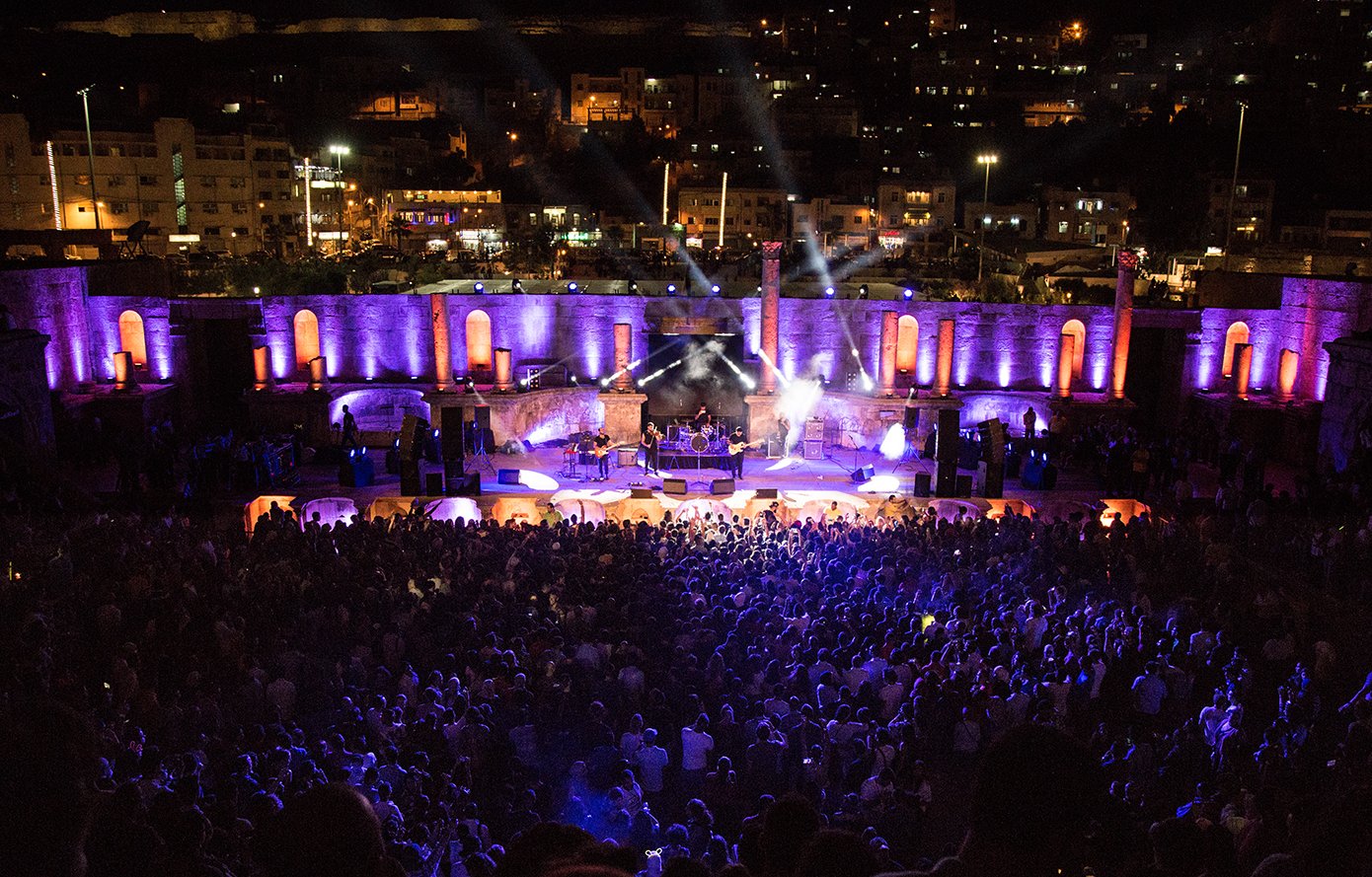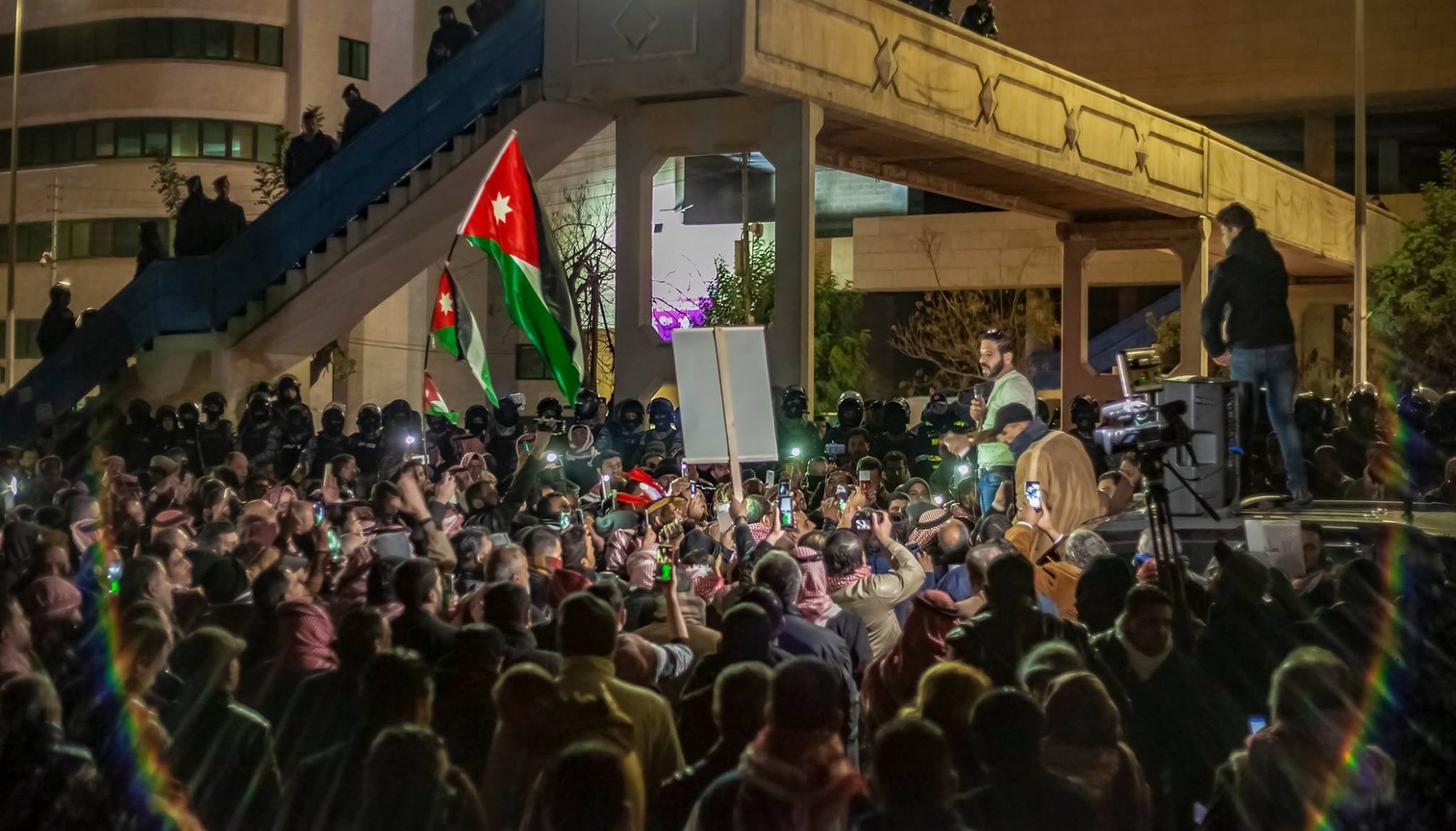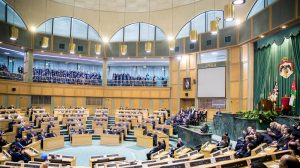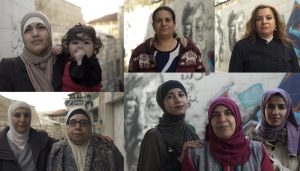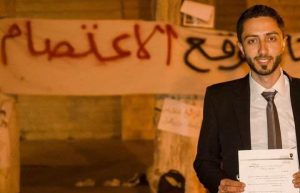Translated from Arabic by Katy Montoya
Jordanian authorities canceled a concert for Lebanese band Mashrou’ Leila that was scheduled to take place on Friday April 29, following objections by religious and political figures against some of the band’s song lyrics.
The event’s organizers, Citarra, received an official letter from the Department of Antiquities on Monday denying their request to use the Roman Amphitheater because the scheduled performance “clashes with the heritage of the historic site,” despite the fact that the group has played at the same site thrice before. Nonetheless, Amman’s governor, Khaled Abu Zeid, told news websites that the reason for canceling the concert was “because its content diverges from the values, customs and traditions of Jordanian society, particularly many of Mashrou’ Leila’s lyrics conflict with the nature of Jordanian society.”
This statement sparked criticism, not only from Mashrou’ Leila’s fans in Jordan, but also several of the artists and activists that make up Jordan’s cultural scene. Many consider this government decision one of various manifestations of the state’s censorship of art and expression.
“We are talking about things that concern us and we are expressing ourselves; we are not trying to insult anyone,” says band member Carl Gerges in an interview with 7iber. “I don’t understand what he is thinking,” he said in reference to Governor Abu Zaid, “but we are going to try even harder to make our voices heard and we aren’t going to stop.”
Citarra sent a written request to the Department of Antiquities (DoA) on January 14 requesting permission to host the concert in the Roman Theatre. They followed up with another request in March, which the director of the DoA referred to the Governor of Amman in order to obtain a security clearance.
The company received verbal approval from the Ministry of Interior and security apparatus in order to go forward with organizing the concert and selling tickets, according to Amal Hammoudeh, Citarra’s director. “We went ahead based on the authorities’ verbal approval because they gave us multiple confirmations and assurances, and because we already went through this experience during the previous concert we organized for the band last August,” said Hammoudeh.
Despite this, and just five days before the concert, Hammoudeh received a call from the Amman Governorate informing her that the approval had been rescinded and that the concert was canceled. The governorate cited the “church’s objection” to the concert, and specifically to Mashrou’ Leila’s song “Jinn.”
Father Rifat Bader, director of the Catholic Center for Studies and Media, told 7iber that this song “takes the holiest religious symbols from the Christian faith and uses them in an immoral context.”
Father Bader clarified that authorities contacted him after he expressed his disapproval of Mashrou’ Leila’s concert in Amman, and that he told them “the problem is not simply in one line in a song but in the entire concert.” He added that he views their songs as a whole as “immoral” and representative of “a cultural decline at odds with the values of Jordanian society.”
This justification was subsequently adopted by the Ministry of Interior. Meanwhile, member of Parliament Bassam Al-Btoush sent a parliamentary memo requesting that the government pull the plug on the concert. He told news website Ammon that the band’s lyrics evoke “sex, homosexuality, and a call for revolution against the government and against society.”
Mashrou’ Leila said in a statement that they deeply regret the lost opportunity to meet their Jordanian fans as well as their Palestinian fans (who organize trips to Jordan in order to attend their concerts) and to celebrate with them the release of their new album, Ibn El Leil, especially since Amman hosts their biggest fan base after Cairo.
“We are going to try and go back to Amman,” Gerges told 7iber. “We have a lot of supporters and a lot of friends there and we feel really attached to the city.”
Mashrou’ Leila has held five concerts in Amman since 2011. The last one took place last August at the Roman Amphitheater to an audience of over 5,000 people. The canceled concert in Amman was part of an international tour for the band’s new album release in cities including Dubai, Beirut, Frankfurt, New York, and others.
Video from the band’s concert in Amman at the Roman Amphitheater, August 2015.
“It is really disappointing to work for months planning an event that attracts a large crowd in Jordan and the region, only for those efforts to go to waste because of lack of clear government policies and whimsical decision-making,” said Hammoudeh, who has been working in the field of cultural and artistic event planning for years.
The band’s supporters in and outside of Amman were angered by the news. Many of them shared an online petition requesting that the Ministry of Tourism and Antiquities revoke their decision and allow Mashrou’ Leila to play in Jordan.
Ra’ed Asfour, the general manager of Al-Balad Theater, said that he considers the decision a rejection of cultural and artistic freedom in general. “It is not important that you like or dislike what Mashrou’ Leila creates,” he wrote on his Facebook page. “It is important however that we do not give in to the voices of extremists and media propheteers.”
Salma Nims, the general secretary of the Jordanian National Commission for Women wrote on her Facebook page that the decision suggests that “there is no fixed political decision and no clear policy on the freedom of artistic and cultural expression in Jordan. Just because some powerful voices in Jordan are objecting [to the concert], the government is scurrying to comply.”
Omar Al Zo’bi, a friend of the band and a strong supporter, sees this decision as a move towards more authoritarianism that could lead to further restrictions on artistic and personal liberties. “I don’t understand how a song can pose a bigger threat than hosting events that encourage hate and violence,” Al Zo’bi told 7iber.
